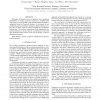Free Online Productivity Tools
i2Speak
i2Symbol
i2OCR
iTex2Img
iWeb2Print
iWeb2Shot
i2Type
iPdf2Split
iPdf2Merge
i2Bopomofo
i2Arabic
i2Style
i2Image
i2PDF
iLatex2Rtf
Sci2ools
ICASSP
2011
IEEE
2011
IEEE
Posterior features for template-based ASR
This paper investigates the use of phoneme class conditional probabilities as features (posterior features) for template-based ASR. Using 75 words and 600 words task-independent and speakerindependent setup on Phonebook database, we investigate the use of different posterior distribution estimators, different distance measures that are better suited for posterior distributions, and different training data. The reported experiments clearly demonstrate that posterior features are always superior, and generalize better than other classical acoustic features (at the cost of training a posterior distribution estimator).
ICASSP 2011 | Posterior Distribution | Posterior Distribution Estimator | Posterior Features | Signal Processing |
Related Content
| Added | 20 Aug 2011 |
| Updated | 20 Aug 2011 |
| Type | Journal |
| Year | 2011 |
| Where | ICASSP |
| Authors | Serena Soldo, Mathew Magimai-Doss, Joel Pinto, Hervé Bourlard |
Comments (0)

